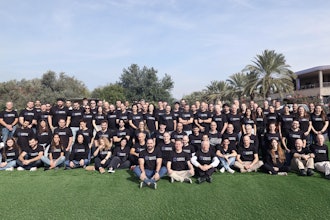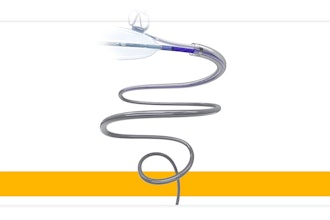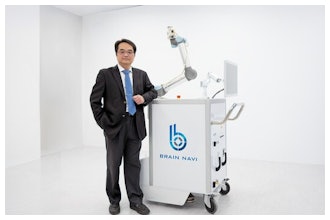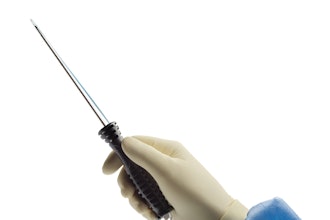
Hoag's spine team has performed the first spinal fusion surgery utilizing the recently FDA-cleared augmented reality (SyncAR) surgical navigator for Spine, co-developed by neurosurgeons from Hoag's Pickup Family Neurosciences Institute and medical visualization platform leader Surgical Theater.
SyncAR for Spine utiizes 3D virtual reconstructions of CT and MRI images to enable detailed visualization of anatomic structures as well as the surgical tools and hardware. The data-rich hologram produces a life-like reconstruction of the spine to assist surgeons in making detailed pre-planned surgical decisions down to the millimeter. Using multiple displays within the AR goggles, 3D real-time feedback maximizes the accuracy of surgical precision and hardware placement.
Hoag's neurosurgeons have already studied and published the benefits of SyncAR technology in the lab, demonstrating an improved accuracy of >99% for screw placement in the spine. SyncAR for Spine subsequently received FDA clearance in September 2022 paving the way for its utilization in the operating room to help real people.
"Integrating augmented reality into the operating room has the potential to improve surgical precision and patient outcomes at hospitals around the world," said Burak Ozgur, M.D., director of Hoag's Spine Center at the Pickup Family Neurosciences Institute, and one of the surgeons who performed the recent SyncAR for Spine procedure.
"SyncAR for Spine is allowing not only enhanced navigation in the operating room, it is enabling more enlightening and informed pre-operative conversations with our patients. They put on the goggles and get to see their own anatomy, and the pathology, with their own eyes. It's truly empowering," said Adam Kanter, M.D., associate executive medical director of the Pickup Family Neurosciences Institute, who assisted Dr. Ozgur during the first SyncAR for Spine patient.
Hoag's comprehensive Spine Center is a recognized leader and provider of the most advanced non-operative and minimally invasive treatment options available. Hoag's board-certified, fellowship-trained spine experts provide personalized patient-centered care that enables them to achieve some of the best clinical outcomes in the nation.
"Much of the discussion of surgical innovation centers around the next hardware iteration," said Daniel Yanni, M.D., F.A.A.N.S., vice chair of the division of neurosurgery, who worked closely with Robert Louis, M.D., chief of neurosurgery and the Empower360 Endowed Chair in Skull Base and Minimally Invasive Neurosurgery, to develop the AR software. "Few people think, 'How do we change surgical execution?' It takes a hospital as forward-thinking as Hoag to advance the way surgery is conducted."
Dr. Louis agreed, saying the speed at which Hoag's expert neurosurgeons were able to develop expertise in and deploy this cutting-edge technology in the operating room can only happen at a hospital as nimble and innovative as Hoag.
"In an academic setting, the speed of evolution would be much slower," said Dr. Louis. "We are leaps and bounds ahead in terms of both the development and deployment of advanced technologies. We are thrilled to bring this technology to our community and beyond."
Dr. Kanter, who spent his previous 15 years in academia at UPMC concurs, "I spent over a decade trying to bring advanced equipment such as robotics and augmented reality to Pittsburgh. At Hoag, it's all already here! Bringing innovative technology into the community is part of the culture at Hoag, we are imagining and creating the future of spine surgery right here in Orange County."
The patient is recovering well, and many more patients will benefit from the technology going forward.
SyncAR for Spine enhanced view could result in more efficient surgeries, streamlined surgical planning, less exposure to X-rays and optimal surgical precision. It also enables training of existing and future spine surgeons while deploying Hoag's technological capabilities to hospitals anywhere.






















